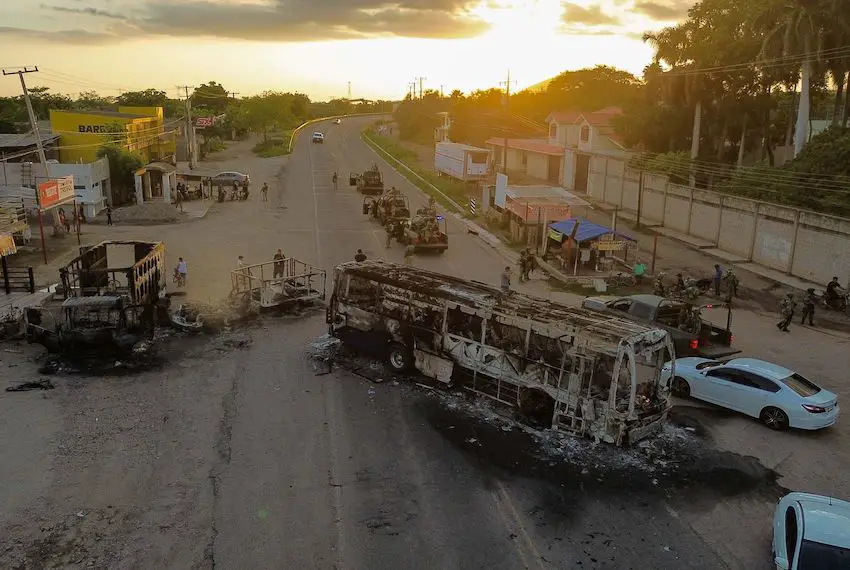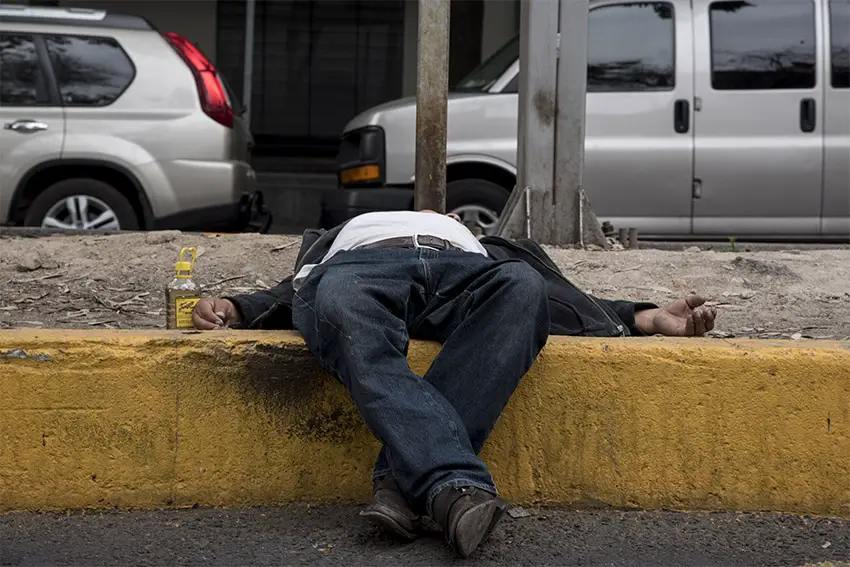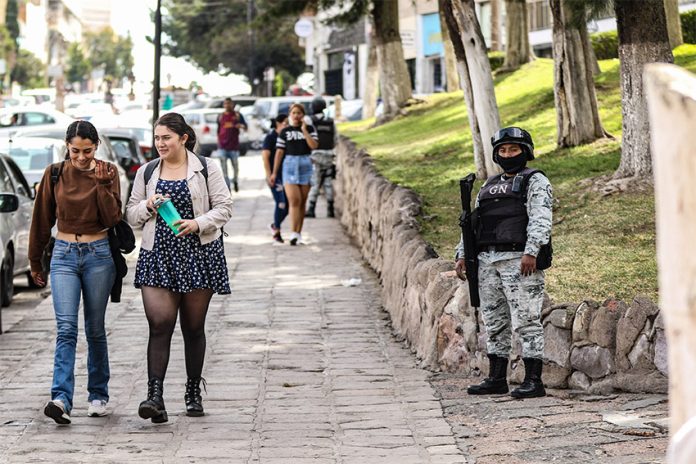Violence remains a significant problem in various parts of Mexico, but more Mexicans than ever consider their city a safe place to live, according to a recent survey on perception of insecurity in Mexican cities.
According to the results of the third quarter National Survey of Urban Public Security (ENSU), 58.6% of respondents believe the city in which they live is unsafe.
That is the lowest percentage since the ENSU was first conducted in 2013, and represents a 2.8-point decline compared to a year earlier and a 0.8-point drop compared to the second quarter survey.
While the percentage of Mexicans who consider their city unsafe has declined around 20 points since former president Andrés Manuel López Obrador took office in late 2018, the fact remains that a strong majority of city-dwellers still have security concerns.
Conducted by the national statistics agency INEGI in late August and early September, the third quarter ENSU found that 64% of women and 52.2% of men consider their city unsafe.
Unsurprisingly, the percentage of surveyed residents of Culiacán who consider that city unsafe increased significantly between the second and third quarters of 2024. A long-running dispute between the “Los Mayos” and “Los Chapitos” factions of the Sinaloa Cartel intensified after the alleged kidnapping and arrest of cartel leader Ismael “El Mayo” Zambada in late July.

For the latest ENSU, INEGI surveyed adult occupants of 27,850 homes in 91 urban areas, including the 16 boroughs of Mexico City. The results were published on Monday.
Which cities have the highest percentages of residents with personal security concerns?
For the first time since 2020, Fresnillo, Zacatecas, didn’t rank as the Mexican city with the highest percentage of residents with security concerns.
The unenviable position was instead taken by Tapachula, a city in southwestern Chiapas just north of the border with Guatemala which almost invariably has a large population of recently-arrived migrants.
In the third quarter of 2024, 91.4% of surveyed residents of Tapachula told INEGI their city was an unsafe place to live. That figure rose 7.2 points in the space of just three months.
The wider border region of Chiapas has recently been plagued by violence as the Jalisco New Generation Cartel and the Sinaloa Cartel wage a war over drug and migrant trafficking routes in the southern state.
After Tapachula, the cities with the next highest percentages of residents with personal security concerns in the third quarter of 2024 were:
- Naucalpan de Juárez, a México state municipality that adjoins Mexico City. Almost nine in 10 residents — 88% — consider the municipality an unsafe place to live.
- Fresnillo, Zacatecas: considered unsafe by 87.9% of surveyed residents, a decline of 6.8 points compared to the previous ENSU.
- Ecatepec, another México state municipality that adjoins Mexico City. Among residents who responded to the ENSU, 87% said the municipality was unsafe.
- Irapuato, Guanajuato: considered unsafe by 86.4% of surveyed residents.
- Tuxtla Gutiérrez, the capital of Chiapas: considered unsafe by 85.9% of surveyed residents
Which Mexican cities have the lowest percentages of residents with personal security concerns?
The cities with the lowest percentages of residents with personal security concerns in the third quarter of 2024 were:
- San Pedro Garza García, an affluent municipality in the metropolitan area of Monterrey, Nuevo León. Just 13.7% of surveyed residents said the municipality was an unsafe place to live.
- The Mexico City borough of Benito Juárez: considered unsafe by 17.5% of residents.
- Tampico, Tamaulipas: 20%
- Puerto Vallarta, Jalisco: 21.3%
- Coahuila, Saltillo: 21.7%.
Perception of insecurity down significantly in 8 cities, up in 4
Compared to the second quarter of 2024, there were statistically significant changes in perceptions of insecurity in 12 Mexican cities, INEGI said.
In eight of those cities, the percentage of residents with security concerns declined significantly, while the percentage increased significantly in four.
The cities where there were significant decreases were:
- Azcapotzalco, Mexico City: 67% in Q2 to 50.6% in Q3 (↓16.4 points)
- Ciudad Obregón, Sonora: 81.2%-65.4% (↓15.8 points)
- Zapopan, Jalisco: 62.6%-50.2% (↓12.4 points)
- Chetumal, Quintana Roo: 73.3%-62.6% (↓10.7 points)
- Monterrey, Nuevo León: 69.8%-59.7% (↓10.1 points)
- Iztacalco, Mexico City: 62.4% in Q2 to 53.5% in Q3 (↓8.9 points)
- Puerto Vallarta, Jalisco: 29%-21.3% (↓7.7 points)
- Fresnillo, Zacatecas: 94.7%-87.9% (↓6.8 points)
The cities where there were significant increases were:
- Culiacán, Sinaloa: 44.7% in Q2 to 55.7% in Q3 (↑11 points)
- Mexicali, Baja California: 60.4%-69.2% (↑8.8 points)
- Tuxtla Gutiérrez, Chiapas: 77.5%-85.9% (↑8.4 points)
- Tapachula, Chiapas: 84.7%-91.9% (↑7.2 points)
The places where Mexicans most commonly feel unsafe
Just over 67% of ENSU respondents reported feeling unsafe while using ATMs on the street, while almost 62% expressed security concerns about traveling on public transport.
More than 50% of respondents said they felt unsafe at the bank, on the streets they regularly use and on the highway.
The numbers were higher among women than among men in all those places — and several others, including the home and the workplace.
Crime and anti-social behavior
Among the respondents who reported having seen or heard criminal activity or anti-social behavior near their homes in the second quarter of 2024, almost six in 10 said they had observed people drinking in the street.

Almost 48% of respondents reported having witnessed a robbery or mugging, and around four in 10 told INEGI they had witnessed homes or businesses being vandalized.
Just under 40% of those surveyed said they had seen people buying or consuming drugs and 36.6% reported having heard frequent gunshots.
Just under one-quarter of respondents said they had witnessed some kind of gang activity in the city in which they live.
Opinions on Mexico’s security forces
The Mexican Navy is the country’s most effective security force, according to the results of the latest ENSU. Almost 88% of respondents said they believe the Navy is very or somewhat effective in preventing and combating crime.
Just under 84% of those polled said the same about the Air Force, while the figures for the Army and the National Guard were 83.1% and 73.5%, respectively.
Almost 56% of respondents said that state police forces are very or somewhat effective in preventing and combating crime, while 48.6% said the same about municipal police.
Citizens’ security expectations
Almost one-third of survey respondents — 31.8% — said they expected the security situation in their city to remain “just as bad” during the next 12 months, while 20% predicted a deterioration.
Almost three in 10 of those polled — 27.7% — said they expected security to improve in their place of residence during the next 12 months, while 18.9% anticipated that the situation would remain “just as good” as it currently is.
With reports from El Economista, Reforma and Milenio
